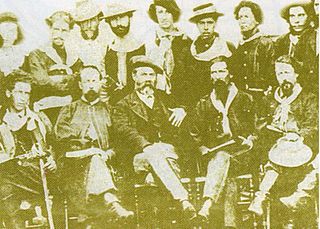 W
WThe British invasions of the River Plate were a series of unsuccessful British attempts to seize control of areas in the Spanish colonial Viceroyalty of the Río de la Plata that were located around the Río de la Plata in South America — in present-day Argentina and Uruguay. The invasions took place between 1806 and 1807, as part of the Napoleonic Wars, when Spain was an ally of Napoleonic France.
 W
WThe Cisplatine War, also known as the Argentine-Brazilian War or in the Argentine and Uruguayan historiography as the Brazil War, was an armed conflict over an area known as Banda Oriental or the "Eastern Bank" in the 1820s between the United Provinces of the Río de la Plata and the Empire of Brazil in the aftermath of the United Provinces' independence from Spain.
 W
WThe Paraguayan War, also known as the War of the Triple Alliance was a South American war fought from 1864 to 1870, between Paraguay and the Triple Alliance of Argentina, the Empire of Brazil, and Uruguay. It was the deadliest and bloodiest inter-state war in Latin America's history. It particularly devastated Paraguay, which suffered catastrophic losses in population, and it was forced to cede territory in dispute with Argentina and Brazil.
 W
WThe number of people who died in the Paraguayan War (1864–1870) is unknown. Widely diverging estimates have been made. "Determining the size of Paraguay's population has always been an exercise in frustration." However, there is a widespread impression that the casualties were immense; there was also some population loss from non-lethal causes such as migration. The Dutch human geographer Jan Kleinpenning thought that Paraguay lost between a quarter and a half of its population, but much higher and lower estimates have been made. No academic demographic scholarship makes it less than 7% or greater than 69%.
 W
WThe Platine Wars is a term used by Brazilian historiography to refer to a series of diplomatic and military conflicts along the 19th century between the Empire of Brazil and neighbouring countries in the River Plate Basin.
 W
WThe Portuguese invasion of the Banda Oriental was a short-lived and failed attempt, beginning in 1811 and ending the following year, by the Portuguese Empire to annex the remaining territory of the Spanish Viceroyalty of the Río de la Plata.
 W
WThe Portuguese conquest of the Banda Oriental was the armed-conflict that took place between 1816 and 1820 in the Banda Oriental, for control of what today comprises the whole of the Republic of Uruguay, the northern part of the Argentine Mesopotamia and southern Brazil. The four-year armed-conflict resulted in the annexation of the Banda Oriental into the United Kingdom of Portugal, Brazil and the Algarves as the Brazilian province of Cisplatina.
 W
WThe Revolution of the Lances occurred in Uruguay from September 12, 1870 to April 6, 1872.
 W
WThe Uruguayan Civil War, also known in Spanish as the Guerra Grande, was a series of armed conflicts between the leaders of Uruguayan independence. While officially the war lasted from 1839 until 1851, it was a part of armed conflicts that started in 1832 and continued until the final military defeat of the Blancos faction in 1904. Out of supporters of presidents Rivera and Oribe grew the Colorado Party and the National Party, both of which received backing and support from foreign sources, including neighboring Empire of Brazil, the Argentine Confederation, Buenos Aires Province as well as European powers, primarily the British Empire and the Kingdom of France, but also a legion of Italian volunteers including Giuseppe Garibaldi. The great diversity of nationalities among the military forces supporting the Colorado Party posed a difficulty when coming to express their struggle in terms of a "national liberation", instead the National Party side put forward a rhethoric on them defending "humanity" and "civilization" against "tyranny".
 W
WThe Uruguayan War was fought between Uruguay's governing Blanco Party and an alliance consisting of the Empire of Brazil and the Uruguayan Colorado Party, covertly supported by Argentina. Since its independence, Uruguay had been ravaged by intermittent struggles between the Colorado and Blanco factions, each attempting to seize and maintain power in turn. The Colorado leader Venancio Flores launched the Liberating Crusade in 1863, an insurrection aimed at toppling Bernardo Berro, who presided over a Colorado–Blanco coalition (fusionist) government. Flores was aided by Argentina, whose president Bartolomé Mitre provided him with supplies, Argentine volunteers and river transport for troops.
 W
WWorld War II, also known as the Second World War, was a global war that lasted from 1939 to 1945. It involved the vast majority of the world's countries—including all the great powers—forming two opposing military alliances: the Allies and the Axis. In a state of total war, directly involving more than 100 million people from more than 30 countries, the major participants threw their entire economic, industrial, and scientific capabilities behind the war effort, blurring the distinction between civilian and military resources. World War II was the deadliest conflict in human history, marked by 70 to 85 million fatalities. Tens of millions of people died due to genocides, premeditated death from starvation, massacres, and disease. Aircraft played a major role in the conflict, including in the use of strategic bombing of population centres, and the only uses of nuclear weapons in war.